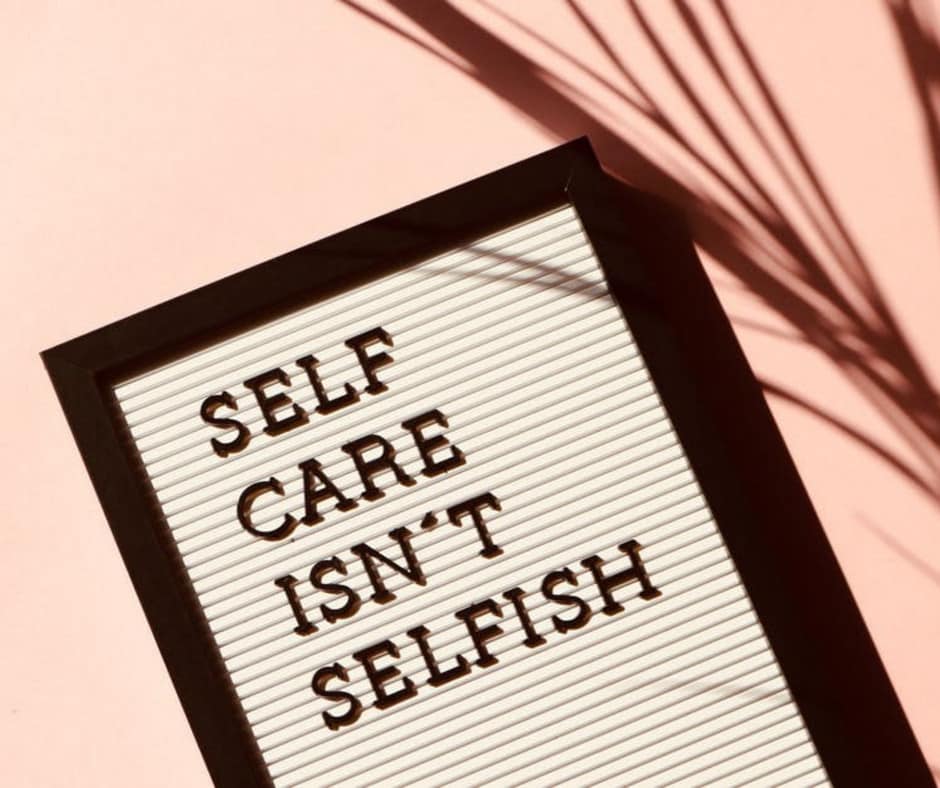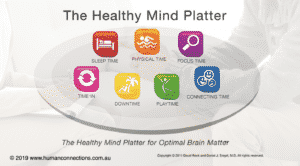As you probably know if you’ve made it this far, the accidental counselor model is based on three core areas or themes: wellbeing, connection, and influence. In this post, we’re going to discuss wellbeing.
We’ll begin by exploring the concept of the The Healthy Mind Platter, which was created and first described by David Rock and Daniel Siegel in their book Brainstorm. While I would probably add diet and nutrition, I think the framework they’ve developed has a lot of handy ideas that we can implement in our model. According to their framework, there are 7 factors that contribute to good brain health and increasing wellness when integrated into our daily lives.
Sleep
Sleep is the absolute foundation upon which all other mental health and wellbeing is built. If we don’t get the right quantity and quality of sleep, it affects our physical and mental health. Routine is critical for obtaining the quality and quantity we need. Having sleep consistency, such has making sure that your room is dark and cool – as you know, you’re much more comfortable and sleep better in a room that is cool rather than hot – is really important with sleep. Additionally, we should really be aiming for between 7 and 9 hours of sleep each night. I know many people think they can get by with 5.5 or 6.5 hours of sleep, and I do that too, but research has shown that this practice has a really detrimental impact on our physical and mental health over time.
Sleep rejuvenates our physical health when we go through slow wave sleep and our mental health when we go through that REM sleep, which is the deeper form of sleep that helps us process traumatic memories and emotions. Moreover, when we’re not sleeping well, we’re usually not eating well either, as we tend to eat more junk food. We also may not be exercising the way we should because we just don’t have the energy for it.
Physical Activity
In addition to sleep, physical activity is key to healthy wellbeing. In fact, some research even suggests that exercise can be as, or even more, effective than antidepressants in treating depression. To learn more about this, check out Professor John Ratey’s work in his book, Spark, or online, where he talks about the critical link between physical health, exercise, and mental health.
Focus
Focus time is the next area they address in the Healthy Mind Platter framework. Your energy flows with where you put your focus. So often we feel really overwhelmed because we think we have 10, 15, even 20 things that we need to get done. But the truth is that we can literally only do one thing at a time. I know that a lot of people say that multitasking is a high-level skill. However, there’s lots of research regarding multitasking, including a blog article on our website, humanconnections.com.au, that shows that our energy and focus dissipate when we multitask, and the opportunity cost in refocusing is enormous.
In other words, if you’re focused on doing something and you get pulled away – distracted by a notification or whatever it is – you have to refocus when you return to what you were doing, and that loss in time is not an effective or productive way to work. Instead, being able to compartmentalize – to say, ok, I’ve got these 10 things to do or these 6 things that are stressing me out, to acknowledge those things and then lock them away and focus on one at a time – is much more effective in terms of productivity and wellbeing.
Connecting
Connecting time is equally important, and we get more of it by using our focus time wisely. Connecting is not just about connecting with other people; it’s also about connecting with nature, which has a rejuvenating quality for our wellbeing. You can connect with nature in simple ways by taking a walk, visiting a local body of water, or enjoying your favorite park. Of course, connecting with other people is important to.
Downtime and Playtime
The next two pieces of the framework – downtime and playtime – are challenging for me personally. Playtime involves making sure that there is some fun and laughter in your life. If you’re laughing, you’re not worried. The two can’t coexist. You can laugh and then a minute later, you can be worried about something, but in the moment when you’re laughing and having fun, you’re not worried. Laughter truly is remarkable medicine. Children are a great example here. They know exactly how to play. They’re in the moment, playing and having fun. As we age, we get too serious. I know that this is definitely a challenge for me. Looking for ways to have fun is really important.
Like playtime, I think downtime also becomes more difficult to conceive of as we age. To understand it, let’s use the metaphor of a car. If your car ran 24/7, it wouldn’t be long before something went wrong. The same is true of human beings. We need to be able to stop and have some downtime – time when we’re simply not doing or thinking about anything. This is often difficult because we’ve got so much to do, but as my great friend and mentor, Dr. David Lake, taught me, there’s always things that need doing. If we try to wait until everything is done before we can relax, we’re never going to get to relax. Instead, we need to schedule time in each day for downtime – time to just switch off. It helps for me to think of it like switching channels. If I’m working on something and it’s just not flowing or progressing, that means I’m not working effectively or efficiently, so maybe it’s time to switch the body’s channels and have some downtime. This means getting up and moving away from work, maybe going for a walk, getting outdoors, or just stretching for 5 minutes, and then getting back to work. It’s truly extraordinary how re-energizing this time can be.
Time-In
Lastly, time-in is what I refer to as your inner world – your thoughts, your emotions. This could mean a practice of mindfulness, meditation, or journaling. If you’re religious, prayer might be a part of this time. It’s a time to be reflective and self-aware, and there are many ways you can go about doing that.
Thanks to The Healthy Mind Platter framework, we now know there are many small but important changes we can make to our daily routines to increase our brain health and wellbeing.
Read the previous Modules here:


